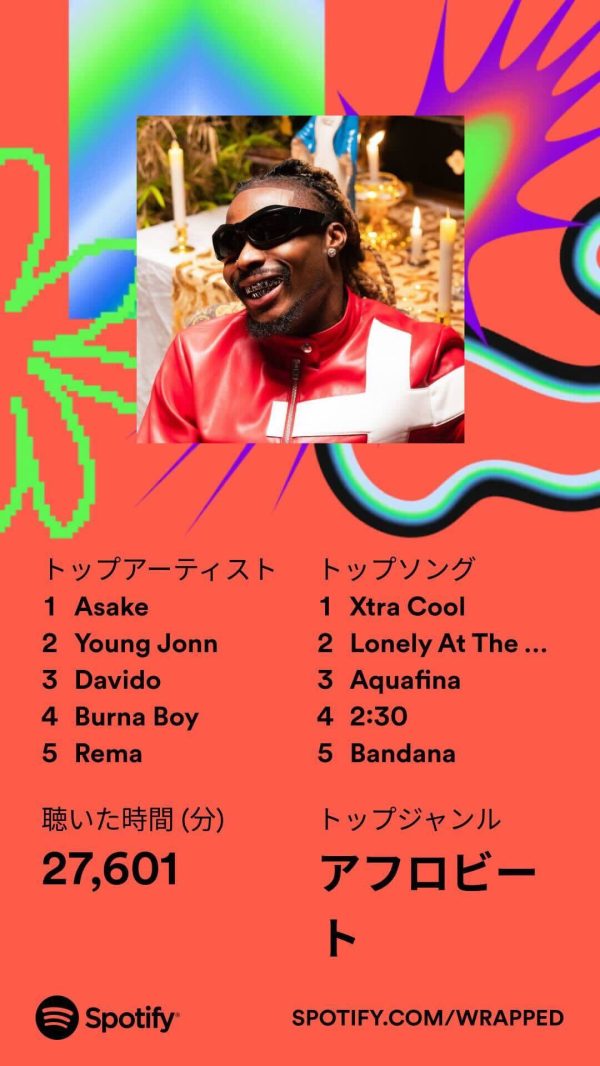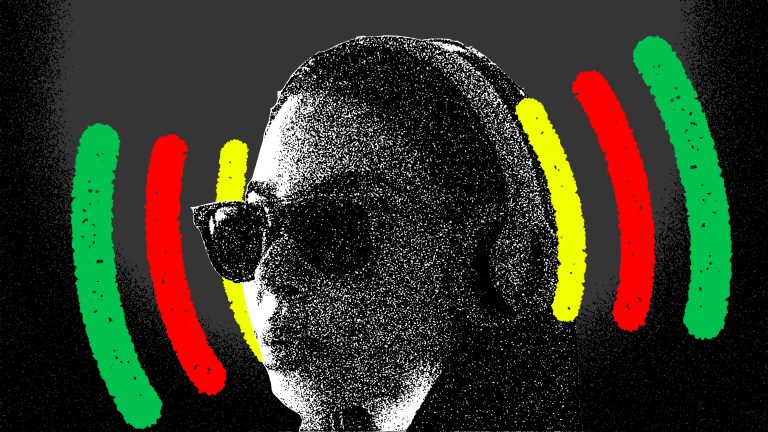Aoi Narita was a marketing consultant for Japanese startups in Kenya in 2021 when she first heard the song “Love Nwantiti” by Nigerian Afrobeats artist CKay, and fell in love with the music genre almost immediately. “I had no idea what he was saying but just the melody was always in my head,” she told Rest of World over text. “Since then, I started listening to different Afrobeats artists, and I still listen to them all the time.”
In November 2022, Narita moved to Nigeria as an investment manager at early-stage venture capital firm Kepple Africa Ventures. “One of the reasons I wanted to live in Nigeria instead of Kenya was because of the music,” she said. Five of the top songs and artists she streamed on Spotify in 2023 were related to Afrobeats. “I think 98% [of the music] I’m listening to [is] Afrobeats. [The] other 2% is K-pop or Japanese songs … But because I only listen to Afrobeats/Amapiano, Spotify doesn’t recommend other types of music,” Narita wrote over text.
Afrobeats has become one of the most popular music genres globally over the past few years. Several artists have sold out big arenas — including stadiums — in the U.S., the U.K., and Europe. There has also been a rise in collaborations between Afrobeats artists and Western pop stars. Much of this success is due to the growth of digital music-streaming platforms, especially Spotify.
Between 2017 and 2022, there was a 550% increase in the number of times Afrobeats songs were streamed on Spotify, according to data released by the company. In 2023 alone, Afrobeats was streamed more than 14 billion times on the app, with London, Paris, and Nairobi ranking among the top five cities.
“[Spotify] has been the largest bridge to connect African talent with the world, and they’ve also been the largest metric for communicating the success and growth of Afrobeats to the rest of the world,” Jude Abaga, rapper and former CEO of Chocolate City, one of Nigeria’s biggest record labels, told Rest of World. People use Spotify’s metrics to define the success of their music and that of the entire industry, he said.

The success of Afrobeats on Spotify is the result of years of on-the-ground work that the company has done in Nigeria, including hiring local staff, according to Nigerian pop culture analyst and consultant Ayomide Tayo. “Spotify has boots on the ground [and] don’t have a standoffish approach,” Tayo told Rest of World. “It doesn’t feel like you are talking to somebody from Berlin, New York, or London. They’ve made Nigerian hires of people with authority, prestige, [and] influence. They’ve also shown that they’re ready to put their money where their mouth is.”
The company’s interest in the genre is evident from the fact that in 2022, revenue generated by Nigerian artists from Spotify alone reached over $27 million, according to Jocelyne Muhutu-Remy, Spotify’s managing director for sub-Saharan Africa. She told Rest of World the company also supports many Afrobeats artists “by spotlighting them to a global audience through our curated playlists and other artists’ support initiatives, such as massive billboards on Times Square.”
In June 2023, Spotify launched Afrobeats: Journey of a Billion Streams, a website dedicated to celebrating the genre. In September 2023, Rema’s “Calm Down” featuring Selena Gomez joined Spotify’s Billions Club, a list of nearly 600 songs with over 1 billion streams. This was “the first time an African artist-led track has racked up a billion streams on Spotify,” the company said on its website.
Spotify has also invested in organizing events in Africa to support the growth of Afrobeats, Tayo said. In 2023, it hosted more than five local events including workshops for creators, album launches for artists, and parties for music industry figures. “When you highlight this kind of giant strides within a genre that’s just 25 years old or thereabout, the world can see that this is deeper than just listening to [a few artists],” Tayo said.
For Dapper Group, a Lagos-based music distribution company, Spotify has been instrumental in reaching more mature markets like the U.S. and Europe. According to Ademola Alugo, the company’s head of distribution, Spotify’s user-friendly interface and features make it the first choice for artists and their audiences globally. “It’s just Spotify, there’s no beating around the bush,” Alugo told Rest of World. “If we narrow it down to one audio-streaming platform that has bridged the gap, the second most impactful platform [Apple Music] is not even neck-to-neck. It’s a distant second.”
Spotify has benefited from the groundwork laid by older music-streaming apps — such as Audiomack, Soundcloud, Boomplay, and the now-defunct Spinlet — before it launched in Africa in 2018, Oyinkansola Fawehinmi, a lawyer and entertainment executive, told Rest of World.
“All the breakthroughs and big moments that Afrobeats has had in a while [weren’t] orchestrated by Spotify in any way,” Fawehinmi said. “And the only thing they’ve done is catch up and latch on to amplify.” According to her, the Chinese-owned Boomplay has played a significant role in globalizing Afrobeats.
Abaga believes that while Spotify’s massive streaming numbers point to how well Afrobeats is doing, they are not the most efficient way to measure success. “Of course, it’s not a perfect metric because there’s context around where these numbers are from — whether these numbers represent the artist’s true audiences as opposed to what their digital audience is. It’s as good as we can get,” he said.



